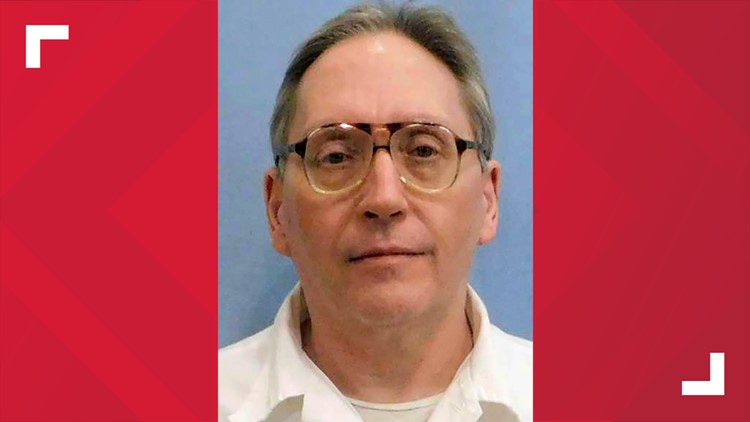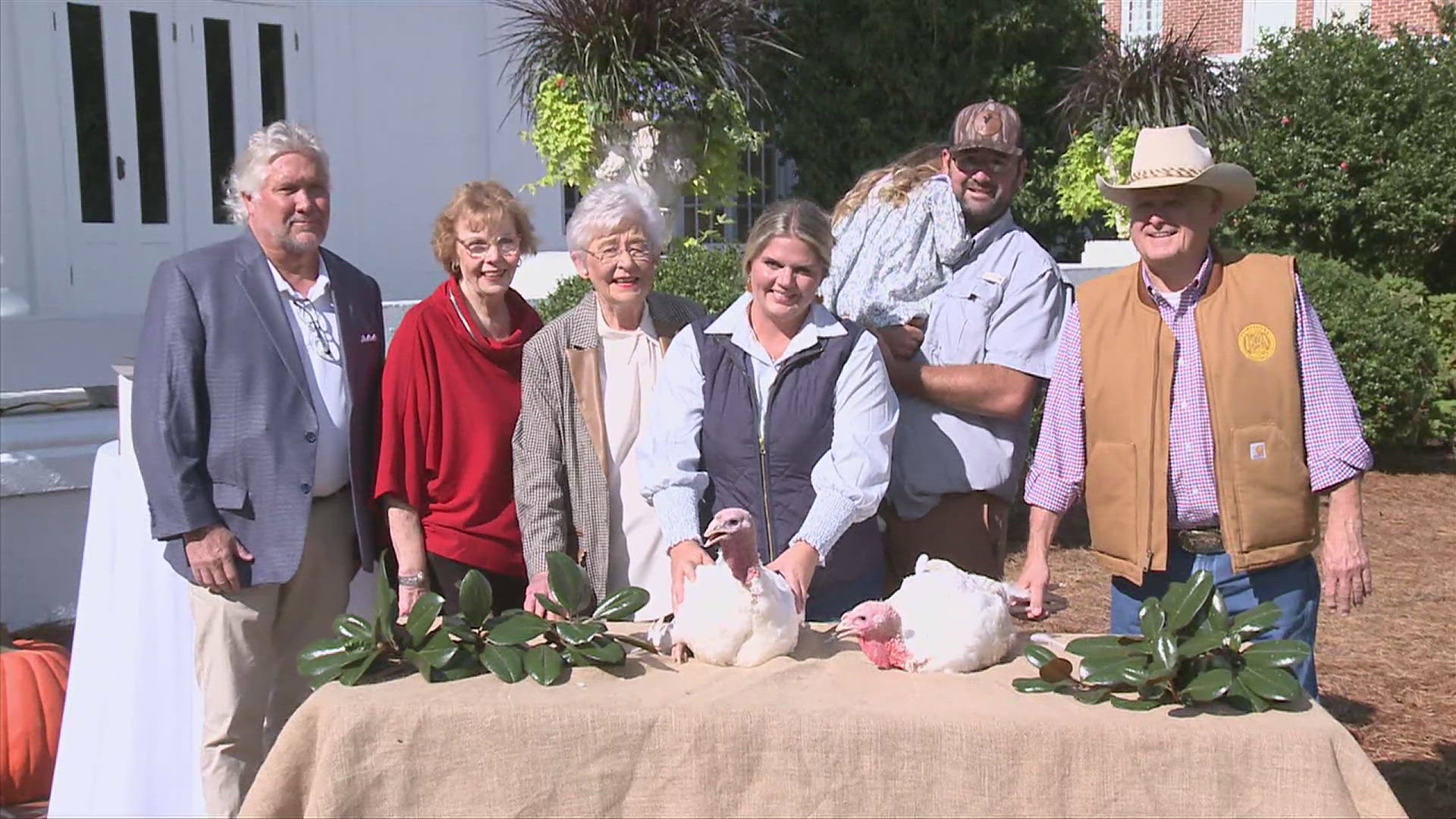ATMORE, Ala. — UPDATE 7/21/2023 Alabama Governor Kay Ivey released this statement after the execution of James Barber:
After the U.S. Supreme Court legally cleared the execution of James Edward Barber to move forward, Governor Ivey told Corrections Commissioner John Hamm that she would not exercise her clemency powers in this case and then directed him to proceed with Mr. Barber’s lawfully imposed death sentence for the 2001 brutal beating of seventy-five-year-old Dorothy Epps.
Governor Ivey issued the following statement:
“Tonight, the justice that James Barber managed to avoid for more than two decades has finally been served. In 2001, 75-year-old Dorothy Epps desperately fought for her life as Mr. Barber brutally and gruesomely beat her to death in her own home. The facts are clear: Mr. Barber confessed to his guilt, and the jury has spoken. His litany of appeals to delay justice finally came to an end, and Mr. Barber has answered for his horrendous crime. In Alabama, we will always work to enforce the law and uphold justice.”
UPDATE (9:30 p.m. 7/20) -- The State of Alabama has yet to execute the man convicted of killing a Madison County woman pending an application to stay the execution that has been taken to the United States Supreme Court.
In the brief filed by Barber's legal team, Barber claims that the state "misrepresented the core issue" of his complaint of cruel and unusual punishment, in that "Alabama has botched three consecutive executions [... and] admitted it made no material change" to the method of execution in the interim.
Barber makes clear in the brief that he prefers to be executed by means of nitrogen hypoxia. At the time of this update, the Supreme Court has not made a ruling.
The state's window to perform the execution closes at 6 a.m. Friday.
The original article continues below:
Alabama plans to execute an inmate on Thursday for the 2001 beating death of a woman as the state seeks to carry out its first lethal injection after a pause in executions following a string of problems with inserting the IVs.
James Barber, 64, is scheduled to be put to death Thursday evening at a south Alabama prison. It is the first execution scheduled in the state since Alabama Gov. Kay Ivey paused executions in November to conduct an internal review.
Ivey ordered the review after two lethal injections were called off because of difficulties inserting IVs into the condemned men's veins. Attorneys for inmate Alan Miller said prison staff poked him with needles for over an hour as they unsuccessfully tried to connect an IV line to him and at one point left him hanging vertically on a gurney during his aborted execution in September. State officials called off the November execution of Kenneth Eugene Smith after they saying they were unsuccessful in connecting the second of two required lines.
Advocacy groups claimed a third execution, carried out in July after a delay because of IV problems, was botched because of multiple attempts to connect the line, a claim the state has disputed.
“Given Alabama’s recent history of botched executions, it is staggering that James Barber’s lethal injection is set to take place,” Maya Foa, director of the anti-death penalty group Reprieve, said. “Three executions in a row went horribly wrong in Alabama last year, yet officials have asserted that ‘no deficiencies’ were found in their execution process.”
Barber was convicted in the 2001 beating death of 75-year-old Dorothy Epps in Harvest, Ala. Prosecutors said Barber, a handyman who knew Epps’ daughter, confessed to killing Epps with a claw hammer and fleeing with her purse. Jurors voted 11-1 to recommend a death sentence, which a judge imposed.
Barber's execution was scheduled for the same day that Oklahoma executed Jemaine Cannon for stabbing a Tulsa woman to death with a butcher knife in 1995 after his escape from a prison work center.
Attorneys for Barber have asked federal courts to block the lethal injection, citing the state's past problems. The 11th U.S. Circuit Court of Appeals refused to halt the execution on Wednesday. Judges noted the state had conducted a review of procedures and wrote that “Barber’s claim that the same pattern would continue to occur” is “purely speculative.”
The court noted that the Alabama Department of Corrections had changed medical personnel and lengthened the timeframe for executions.
“ADOC conducted a full review of its execution processes and procedures, determined that no deficiencies existed with the protocol itself, and instituted certain changes to help ensure successful constitutional executions,” the court wrote.
Barber appealed to the U.S. Supreme Court on Thursday, asking justices to stay the execution. His lawyers wrote that the execution "will likely be botched in the same manner as the prior three.”
“Alabama’s past three execution proceedings imposed needless physical and emotional suffering on inmates to such an extent that Alabama paused its lethal injection executions and undertook an internal review of its procedures," Barber’s lawyers wrote in the Supreme Court filing. “Shockingly, however, that review resulted in no substantive changes to Alabama’s procedures or to the qualifications of those carrying out lethal injection executions.”
The Alabama attorney general's office has urged the Supreme Court to let the execution proceed. The state wrote that the previous executions were called off because of a “confluence of events—including health issues specific to the individual inmates and last-minute litigation brought by the inmates that dramatically shortened the window for ADOC officials to conduct the executions."
“Dorothy Epps, Smith’s victim, has survivors who have already waited overlong to see justice done,” the office added.
In the hours leading up to the scheduled execution on Thursday, Barber had 22 visitors and two phone calls, a prison spokesperson said. Barber ate a final meal of loaded hashbrowns, western omelet, spicy sausage and toast.
One of the changes Alabama made following the internal review was to give the state more time to carry out executions. The Alabama Supreme Court did away with its customary midnight deadline to get an execution underway in order to give the state more time to establish an IV line and battle last-minute legal appeals. The state will have until 6 a.m. Friday to start Barber’s execution.



